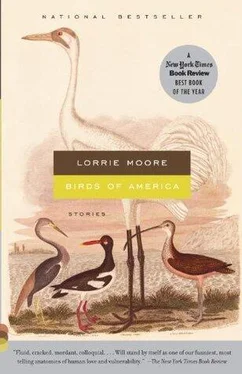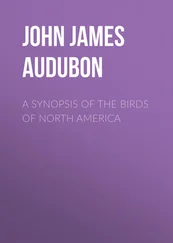Nuptial forensics. Ruth would let her marriage live. No mercy killing, no autopsy. She would let it live! Ha! She would settle, as a person must, for not knowing everything: ignorance as mystery; mystery as faith; faith as food; food as sex; sex as love; love as hate; hate as transcendence. Was this a religion or some weird kind of math?
Or was this, in fact, just spring?
Certain things helped: the occasional Winston (convinced, as Ruth was, despite the one lung, the lip blisters, and the keloidal track across her ribs, that at the end she would regret the cigarettes she hadn’t smoked more than the ones she had; besides, she no longer coughed much at all, let alone so hard that her retinas detached); pots of lobelia (“Excuse me, gotta go,” she had said more than once to a loquacious store clerk, “I’ve got some new lobelia sitting in a steaming hot car”); plus a long, scenic search for a new house.
“A move … yes. A move will be good. We’ve soiled the nest, in many respects,” her husband had said, in the circuitous syntax and ponderous Louisiana drawl that, like so much else about him, had once made her misty with desire and now drove her nuts with scorn. “Think about it, honey,” he’d said after the reconciliation, the first remission, and the initial reconnaissance through the realtors — after her feelings had gone well beyond rage into sarcasm and carcinoma. “We should probably consider leaving this home entirely behind. Depending on what you want to do — or, of course. If you have another home in mind, I’m practically certain I’d be amenable. We would want to discuss it, however, or anything else you might be thinking of. I myself — though it may be presumptuous of me, I realize — but then, hey: it wouldn’t be the first time, now would it? I myself was thinking that, if you were inclined—”
“Terence!” Ruth clapped her hands twice, sharply. “Speak more quickly! I don’t have long to live!” They’d been married for twenty-three years. Marriage, she felt, was a fine arrangement generally, except that one never got it generally. One got it very, very specifically. “And, please,” she added, “don’t be fooled by the euphemisms of realtors. This was never a home, darling. This is a house .”
In this way — a wedding of emotionally handicapped parking spaces, an arduously tatted lace of property and irritation — they’d managed to stay married. He was not such a bad guy! — just a handsome country boy, disbelieving of his own luck, which came to him imperfectly but continually, like crackers from a cookie jar. She had counted on him to make money — was that so wrong? — and he had made some, in used-car dealerships and computer software stock. With its sweet, urgent beginnings, and grateful, hand-holding end, marriage was always its worst in the middle: it was always a muddle, a ruin, an unnavigable field. But it was not, she felt, a total wasteland. In her own marriage there was one sweet little recurrent season, one tiny nameless room, that suited and consoled her. She would lie in Terence’s arms and he would be quiet and his quietness would restore her. There was music. There was peace. That was all. There were no words in it. But that tiny spot — like any season, or moon, or theater set; like a cake in a rotary display — invariably spun out of reach and view, and the quarreling would resume and she would have to wait a long time for the cake to come round again.
Of course, their daughter, Mitzy, adored Terence — the hot, lucky fire of him. In Ruth, on the other hand, Mitzy seemed to sense only the chill spirit of a woman getting by. But what was a person in Ruth’s position supposed to do, except rebuild herself, from the ground up, as an iceberg? Ruth wanted to know! And so, in the strange, warm dissolutions that came over her these May nights silently before sleep, a pointillist’s breaking up of the body and self and of the very room, a gentle fracturing to bubbles and black dotted swiss, Ruth began, again, to foresee her own death.
At first, looking at other houses on Sunday afternoons — wandering across other people’s floors and carpets, opening the closets to look at other people’s shoes — gave Ruth a thrill. The tacky photos on the potter’s piano. The dean with no doorknobs. The orthodontist with thirty built-in cubbyholes for his thirty tennis shoes. Wallpaper peeling like birch skin. Assorted stained, scuffed floors and misaligned moldings. The Dacron carpets. The trashy magazines on the coffee table. And those economy snacks! People had pretzel boxes the size of bookcases. And no bookcases. What would they do with a book? Just put it in the pretzel box! Ruth took an unseemly interest in the faulty angles of a staircase landing, or the contents of a room: the ceramic pinecone lamps, the wedding photo of the dogs. Was the town that boring that this was now what amused her? What was so intriguing to her about all this home owning thrown open to the marketplace? The airing of the family vault? The peek into the grave? Ruth hired a realtor. Stepping into a house, hunting out its little spaces, surveying its ceiling stains and roof rot exhilarated her. It amazed her that there was always something wrong with a house, and after awhile, her amazement became a kind of pleasure; it was pleasing that there should always be something wrong. It made the house seem more natural that way.
But soon she backed off. “I could never buy a house that had that magazine on the coffee table,” she said once. A kind of fear overtook her. “I don’t like that neo-Georgian thing,” she said now, before the realtor, Kit, had even turned off the car, forcing Kit to back out again from the driveway. “I’m sorry, but when I look at it,” Ruth added, “my eye feels disorganized, and my heart just empties right out.”
“I care about you, Ruth,” said Kit, who was terrified of losing clients and so worked hard to hide the fact that she had the patience of a gnat. “Our motto is ‘We Care,’ and that is just so true: We really, really care, Ruth. We care about you. We care about your feelings and desires. We want you to be happy. So, here we are driving along. Driving toward a thing, then driving past. You want a house, Ruth, or shall we just go to the goddamn movies?”
“You think I’m being unrealistic.”
“Aw, I get enough realism as it is. Realism’s overrated. I mean it about the movies.”
“You do?”
“Sure!” And so that once, Ruth went to the movies with her realtor. It was a preseason matinee of Forrest Gump , which made her teary with weariness, hurt, and bone-thinning boredom. “Such a career-ender for poor Tom Hanks. Mark my words,” Ruth whispered to her realtor, candy wrappers floating down in the dark toward her shoes. “Thank God we bought toffees. What would we do without these toffees?”
· · ·
Eventually, not even a month later, in Kit’s white Cabriolet, the top down, the wind whipping everyone’s hair in an unsightly way, Ruth and Terence took a final tour of the suburbanized cornfields on the periphery of town and found a house. It was the original ancient four-square farmhouse in the center of a 1979 subdivision. A man-made pond had been dug into the former field that edged the side yard. A wishing well full of wildflowers stood in the front yard.
“This is it,” Terence said, gesturing toward the house.
“It is?” said Ruth. She tried to study it with an open mind — its porch and dormers angled as if by a Cubist, its chimney crumbling on one side, its cedar shingles ornately leprous with old green paint. “If one of us kisses it, will it turn into a house?” The dispiriting white ranches and split-levels lined up on either side at least possessed a geometry she understood.
“It needs a lot of work,” admitted Kit.
Читать дальше












